Introduction
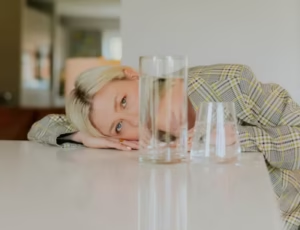
Many people underestimate the role of water in managing stress. While we often think of hydration as only important for physical health, research shows that drinking less water and stress are strongly linked.

Dehydration can make the body release more cortisol—the hormone responsible for stress—which can disturb mental balance, energy levels, and even immunity.
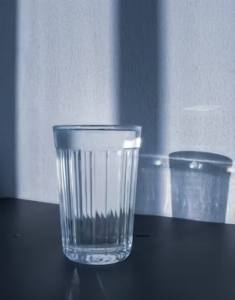
A new study explored how regular water intake influences the body’s reaction to stress. The findings highlight why maintaining proper hydration is not only vital for physical health but also for emotional well-being.

The Connection Between Drinking Less Water and Stress
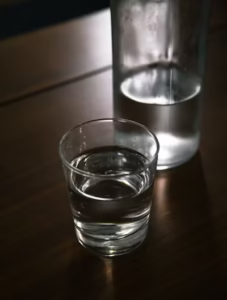
Water supports every function of the body, from circulation to brain activity. When people drink less than the recommended daily amount, the body enters a state of low hydration.
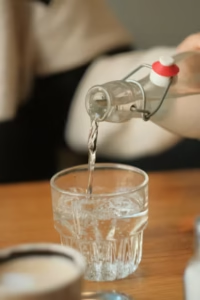
Signs include darker urine, reduced urination, and frequent fatigue.
Scientists have discovered that when hydration is poor, stress hormone levels tend to rise.

This means that drinking less water and stress go hand in hand, as low hydration makes it harder for the body to manage emotional pressure.
Cortisol and Its Impact on the Body

Cortisol, also called the “stress hormone,” plays an essential role in survival. It spikes when the body faces danger or pressure, preparing us for a fight-or-flight response.

Normally, cortisol follows a daily rhythm—high in the morning and lower at night.
However, if hydration is lacking, cortisol regulation can be disturbed. This may cause higher stress reactivity, weaker immunity, poor metabolism, and inflammation in the body.

Studies show that people who drink less than 1.2 liters of water daily often have higher cortisol levels compared to those who stay hydrated.
Details of the Study
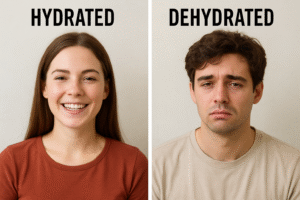
To better understand the connection between drinking less water and stress, researchers studied healthy men and women aged 18–35 years.
None of the participants had health conditions like diabetes, sleep disorders, or heart problems.
They were divided into two groups:
-
Low fluid drinkers (LOW group)
-
High fluid drinkers (HIGH group)
For seven days, participants recorded their daily fluid intake. Those who consumed too much caffeine or alcohol were excluded to avoid confusion in the results.
After this period, participants underwent the Trier Social Stress Test (TSST), a well-known method of creating psychological stress in a lab environment.
Researchers then measured saliva and urine samples to check hydration and cortisol levels.
What the Researchers Found
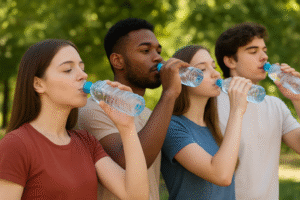
The results revealed clear differences:
-
The HIGH group showed healthier hydration markers, such as lighter urine and lower levels of copeptin (a stress-related hormone).

-
The LOW group, however, was often suboptimally hydrated. Most participants in this group had higher stress hormone levels even before the stress test began.

When both groups faced the stress test:
-
Cortisol levels rose in everyone, but the increase was much stronger in the LOW group.
-
People who were regularly hydrated had a more stable response, while low water drinkers showed exaggerated stress hormone spikes.
This indicates that drinking less water and stress reactions are directly related.
Why Hydration Matters for Mental Health
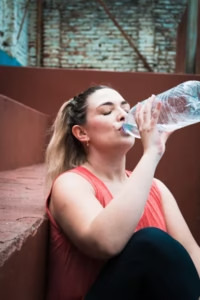
Hydration is not just about quenching thirst. It is about keeping the nervous system, brain, and hormones in balance. When you don’t drink enough water:

-
Cortisol spikes become stronger.
-
Stress feels heavier and harder to control.
-
The risk of anxiety and irritability increases.
-
Long-term effects may include higher chances of cardiovascular and metabolic diseases.

Simply put, a well-hydrated body manages stress better than a dehydrated one.
Limitations of the Study

Although the study provided strong evidence, it also had limitations:
-
It was short-term (only seven days).
-
It involved only young, healthy adults.
-
It did not examine differences between men and women in depth.

This means more research is needed to see how drinking less water and stress affect older adults, children, or people with chronic health conditions.
My Opinion

I believe this study highlights something we often ignore: water is not only a physical need but also a mental one. Just like exercise and sleep, hydration plays a role in controlling stress levels.
My Suggestion

If you want to reduce stress naturally, make water your first step. Aim for at least 2–2.5 liters daily, depending on your body and activity level.
Avoid replacing water with soda, coffee, or alcohol, as they can worsen dehydration.
My Calculation

Even a small change in daily water intake can bring results. For example, drinking just 500 ml more water daily may help reduce cortisol spikes.
That means adding two glasses of water to your current routine could make a difference in stress levels.
My Experience / View
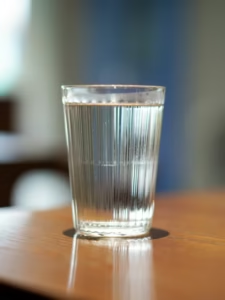
Personally, I have noticed that on days when I don’t drink enough water, I feel more tired, irritable, and anxious.
After increasing my water intake, my focus improved, and I felt more calm during stressful situations.
Conclusion
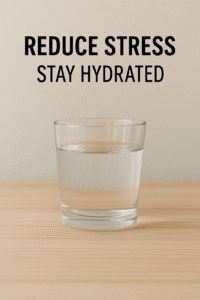
The evidence is clear: drinking less water and stress are deeply connected. People who stay hydrated handle stress better, while those with poor hydration habits experience stronger cortisol reactions.

Although more studies are needed, one thing is certain—drinking enough water is a simple, natural, and effective way to support mental and physical health.

So next time you feel stressed, don’t just take a deep breath—drink a glass of water.
ремонт электроводонагревателя https://fix-boiler-moskva.ru/
когда менять сцепление
https://avto100k.ru/